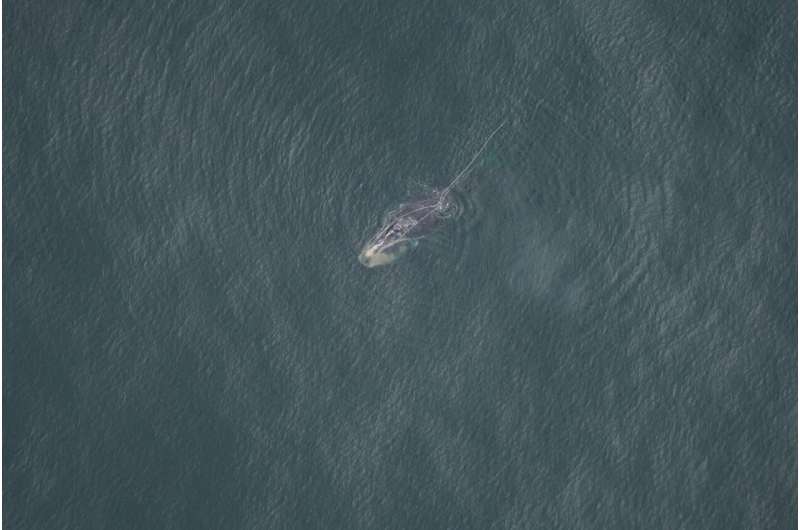Why critically endangered female whales struggle to reproduce

The North Atlantic right whale is currently one of the most endangered whale species, listed as Critically Endangered by the International Union for Conservation of Nature (IUCN).
A new study from researchers at Macquarie University, Ursinus College and the New England Aquarium has uncovered why this species has been rapidly declining in population over the past 8 years, attributing the decrease to a growth in human and fishing interferences in their natural habitats.
Joshua Reed, Ph.D. Candidate and lead author from the School of Natural Sciences at Macquarie University says that using an individual's reproductive history, rather than age, when modeling population trends of female whales provides a better insight into their abundance.
"Our research found that of the estimated 142 female right whales alive in the population at the beginning of 2018, only 72 were actually capable of reproducing. This has certainly influenced the species' decline in recent years," says Mr. Reed.
"North Atlantic right whales live in one of the most industrialized habitats of any whale species. Due to the highly urbanized environment, biological and human factors have impacted the survival of the North Atlantic right whale including reduced food availability, vessel strikes, fixed-gear entanglements and a declining female population," says co-author Honorary Professor Robert Harcourt from Macquarie University.
The researchers also found that the "recruitment" of new individuals into the breeding portion of the North Atlantic right whale population has reduced following 2000, with females born after 2000 being half as likely to start reproducing compared to individuals born earlier.
"The evidence that females are not maturing to have calves is very disturbing, and the current trajectory for breeding females is shocking. But there is an important ray of hope in this analysis. If we can eliminate entanglements, then there's a good chance that the cohort of females who haven't started calving yet will do so. Then we'd have a baby boom," says co-author Dr. Peter Corkeron, Senior Scientist at the New England Aquarium's Anderson Cabot Center for Ocean Life.
"It is always heart wrenching to consider the slow and painful demise of individual whales, such as Snow Cone, who has been entangled multiple times in fishing gear, including while calving. However, it can be difficult to connect how the loss of an individual, and particularly a breeding female, reverberates through the entire species," says co-author Dr. Leslie New from Ursinus College.
"This work does just that, showing how the continuing loss of reproductively active females, such as Snow Cone, coupled with the inability of other females to even enter the breeding population, has contributed to the species decline, and could potentially lead to their extinction within our lifetimes if serious action is not taken."
The researchers noted that the addition of new individuals into the population, through the successful birth and survival of calves, is critical for the continued survival of the species.
"To ensure that the North Atlantic right whale thrives in the future, we need to acknowledge that removing the risk of entanglement, and thus a major source of injury and death, is necessary if enough females are to join the breeding population and successfully reproduce to ensure the species persistence," says Mr. Reed.
The study is published in Frontiers in Marine Science.
More information: Joshua Reed et al, Multi-event modeling of true reproductive states of individual female right whales provides new insights into their decline, Frontiers in Marine Science (2022). DOI: 10.3389/fmars.2022.994481
Journal information: Frontiers in Marine Science
Provided by Macquarie University

















